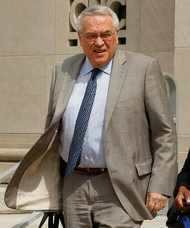Much of the money spent has been used to buy television ads, half of which are being broadcast outside New York, celebrating the state’s economic success stories as part of an effort to lure and keep business here.
Gov. Andrew M. Cuomo’s administration, which began the campaign, says the ads are a valuable tool for recruiting businesses, but critics say they are a backdoor way of elevating the governor’s stature, even though they do not mention his name and he is prohibited from appearing in them.
“We are doing everything we can to level the playing field to bring businesses and jobs to the state of New York, and will continue to double down on those efforts as long as this governor is in office,” Melissa DeRosa, a spokeswoman for Mr. Cuomo, said.
A portion of the campaign is being financed with money from public authorities, which have missions that include protecting the environment and financing public building projects, drawing some criticism. Additionally, a coming phase of the campaign will use $40 million from the federal government to promote businesses and tourism in the areas struck by Hurricane Sandy.
When the campaign began last June, a top state official, Howard Glaser, noted that New York was competing with other states to attract and keep businesses.
“Connecticut is spending $27 million promoting its state, Michigan $25 million, New Jersey ran a campaign to recruit businesses featuring its governor,” Mr. Glaser, the state operations director, said. “California spent $50 million on a campaign to promote its state. We have to compete.”
Mr. Cuomo’s office says that much of the money has not yet been spent — it says it spent $24 million on ad buys for the campaign last year, and another $12 million so far this year, and it says the scale of the campaign is similar to that in other states. A state filing last December said that by then, most of the initial $50 million allotment for the campaign had “been either spent or committed.”
Critics of the “Open for Business” campaign, which the Legislature approved, have proliferated as the commercials receive heavy airtime on networks like CNN, CNBC and NBC. Some have questioned whether the campaign is a wise use of money, while others have questioned whether New York, with its high tax burden, is truly business-friendly.
Andrew Rudnick, the chief executive of the Buffalo Niagara Partnership, a trade group, said in an interview, “New York’s business climate still isn’t competitive enough, in any objective sense of the word, for an ad to overcome.” He added, “I don’t think it’ll make a measurable amount of difference.”
Former Gov. Eliot Spitzer, who like Mr. Cuomo is a Democrat, said in an appearance on NY1 this week, “They’ve spent who knows how much money on TV ads that are fluff and a waste of taxpayer money.”
One of the forces behind the campaign has been Harvey Cohen, who served as the adman for the political campaigns of the governor’s father, former Gov. Mario M. Cuomo, and who now works at the Empire State Development Corporation, the state’s economic development arm. Advertising giant BBDO was hired to produce the commercials.
In a presentation to Empire State Development’s board in 2011, Mr. Cohen described the campaign as confronting “a classic marketing problem.” He said consultants who helped businesses relocate had misconceptions about New York.
“Yes they knew high taxes, yes they knew regulations, yes they knew right to work, but interestingly, they would tell me that many companies don’t even know that upstate New York exists,” he said, adding, “They certainly don’t know the new attitude brought in by the new administration.”
An early commercial featured a voice-over by Robert De Niro and the Jay-Z song “Empire State of Mind.”
“Some said we lost our edge,” Mr. De Niro narrated. “Well today, there’s a new New York State, one that’s working to attract businesses and create jobs.”
Another ad highlighted small businesses, from an ice cream factory to a bicycle shop, while a third ad focused on the state’s emerging technology sector.
In a statement last year, Mr. Cuomo said, “By telling the stories of businesses that are already succeeding in our state, we can attract even more economic opportunity and jobs.”
But others have raised concerns that the governor and lawmakers are draining money from ostensibly independent public authorities for purposes running counter to their missions, in a practice that is controversial but common in Albany. The state regularly takes what it describes as excess funds from public authorities, to finance state programs.
A state official said the early stages of the ad campaign were partly financed by the New York State Energy Research and Development Authority, which runs programs intended to reduce energy consumption and improve the environment, and the Dormitory Authority of New York, which supports universities and nonprofit institutions.
Last December, the Cuomo administration added another $50 million. The money came from the State Power Authority, which was created to generate and provide cheap electricity to lower bills for residents and business. In public filings, officials with the authority described the advertising campaign as part of a broader effort by it to promote economic development.
Richard Brodsky, a Democrat and former assemblyman from Westchester County, said, “These authorities should be lowering electric rates, building dormitories and otherwise doing what they were created to do, rather than being raided” to pay for the ads.
Last month, the state expanded the “Open for Business” campaign, using $40 million from the federal aid package intended to help New Yorkers recover from Hurricane Sandy, records show. A new series of ads will, according to a state document, “promote seasonal business in areas” affected by the storm and a program focused on helping small businesses rebuild. New Jersey plans to spend $25 million of its federal funds on a campaign to promote the Jersey Shore and other storm-damaged areas.
Article source: http://www.nytimes.com/2013/05/04/nyregion/new-york-states-ads-to-attract-business-also-draw-complaints.html?partner=rss&emc=rss

